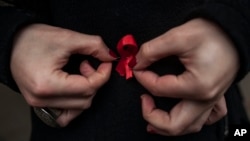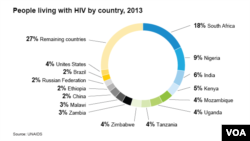U.N. Secretary-General Ban Ki-moon is praising the progress the world has made in combating AIDS, but warns "the gains remain fragile."
In a statement for Monday's World AIDS Day, Ban highlighted the importance of addressing gaps in access to treatment, particularly for children and young women who are not getting necessary care. He urged world leaders to do what is necessary to reach the goal of eradicating AIDS by 2030.
Worldwide, 35 million people are living with HIV, the virus that causes AIDS. The U.N. said 19 million of them do not know they are infected, and used World AIDS Day to call for closing the gap in testing and the availability of antiretroviral therapies.
Sub-Saharan Africa still accounts for more than 70 percent of the HIV-infected population, but new infections there have declined by one-third since 2005.
Meanwhile, infections have been rising during that period in the Middle East and North Africa, as well as in Eastern Europe and Central Asia.
President Barack Obama says the United States remains committed to leading the fight against HIV/AIDS.
In a statement released for World AIDS day, he said that as part of the U.S. plan for AIDS relief, some 7 million people around the world are receiving antiretroviral treatment.
World AIDS Day has been held on December 1 every year since 1988 as an occasion to show support for those living with HIV/AIDS, remember those who have died and focus on fighting the epidemic.
The U.N. has set a number of goals for 2015 -- including cutting the number of sexually transmitted HIV cases by half, eliminating new HIV infections among drug users and ensuring that all eligible people living with HIV get access to antiretroviral therapy.
According to ONE, an international campaigning and advocacy organization, in 2013, almost 13 million people around the world were receiving antiretroviral treatment for HIV/AIDS, up from only 300,000 in 2002.
More than 9 million of those lived in sub-Saharan Africa. Meanwhile, global deaths due to AIDS have dropped consistently in that time, down from 2.4 million in 2004 to 1.5 million in 2013.












